

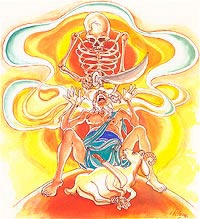 |
Verse 129. Of Others Think Of As Your Own Self
Explanation: All tremble at violence, all fear death. Comparing oneself with others do not harm, do not kill. |
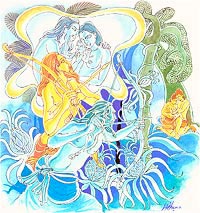 |
Verse 130. To All Life Is Dear
Explanation: All are frightened of being hurt or any threat to one’s life. To all life is dear. Seeing that others feel the same way as oneself, equating others to oneself, refrain from harming or killing. |
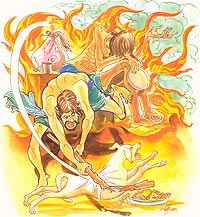 |
Verse 131. Those Who Do Not Receive Happiness
Explanation: People who like to be happy and are in search of pleasure hurt others through various acts of violence for their own happiness. These victims too want to be happy as much as those who inflict pain on them. Those who inflict pain do not achieve happiness even in their next birth. |
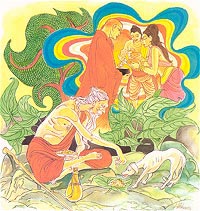 |
Verse 132. Those Who Do Not Receive Happiness
Explanation: If people who are in search of pleasure and happiness for themselves, do not hurt or torture others or give pain to others, then they achieve happiness in the next life too. |
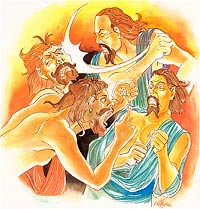 |
Verse 133. Retaliation Brings Unhappiness
Explanation: Never speak harsh words. If you do, you will also be replied to in the same vein. This kind of cross-talk is painful. It may lead to an exchange of blows. |
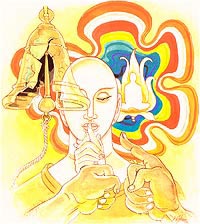 |
Verse 134. Tranquillity Should Be Preserved
Explanation: When an individual is tranquil and silent like a flattened out metal pot, it is as if he has already attained Nibbana. Such a person does not engage in vain talk. Even when it is struck, the flattened out metal pot cannot make a sound in return. |
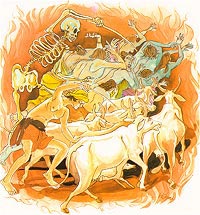 |
Verse 135. Decay And Death Terminate Life
Explanation: The cowherd drive the cattle along to the pasture with the goad. In the same way, decay and death drive the life span of beings. |
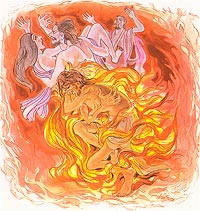 |
Verse 136. Results Of Evil Torment The Ignorant
Explanation: Fools, unaware that evil rebounds, through evil acts they hurt themselves. As flies leap into fire and burn, their own executioners they become. |
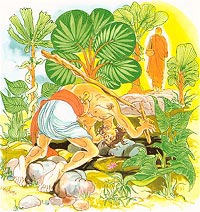 |
Verse 137. The Evil Results of Hurting The Pious
Explanation: If one attacks one who is harmless, or ill-treat innocent beings, ten woeful states lie here and now to one of which he shall befall. |
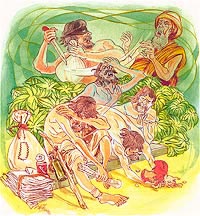 |
Verse 138. Evil Results Of Hurting Harmless Saints
Explanation: The following ten forms of suffering will come to those who hurt the harmless, inoffensive saints: severe pain; disaster; physical injury; serious illness, mental disorder. |
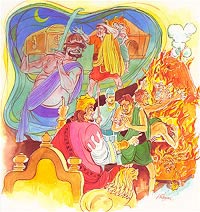 |
Verse 139. Harming The Holy Is Disastrous
Explanation: Trouble from rulers; grave charges; loss of relatives; property loss. |
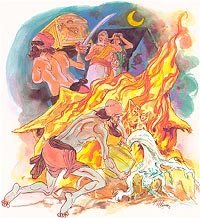 |
Verse 140. Woeful States In The Wake Of Evil Doing
Explanation: Or else, his houses will be burnt by fire and, upon death, that person will be reborn in hell. |
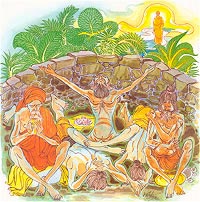 |
Verse 141. Practices That Will Not Lead To Purity
Explanation: A person seeking the purification of his soul may practice the ritual of wandering about naked; or else he may wear turbans; he may even smear his body with mud; he may even refrain from partaking of food as an austerity to obtain purity; he may lie on bare earth; or else he may throw dust all over his body. And again, some may practice a squatting posture. All of these will not wash a person into spiritual purity if his wavering of mind is not overcome. |
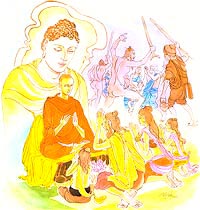 |
Verse 142. Costumes Do Not Mar Virtue
Explanation: Although a person may be attractively dressed, he behave in a harmonious manner. He is tranquil, restrained: assured of liberation. He leads the religious life. He is not violent towards beings. Such a person is truly a priest (brahmana) and a mendicant monk (bhikkhu). |
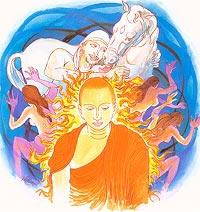 |
Verse 143. Avoid Evil Through Shame
Explanation: Rarely in the world is that person who is restrained by shame. Like a well-breed horse who avoids the whip, he avoids disgrace. |
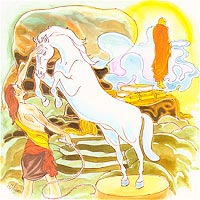 |
Verse 144. Effort Is Necessary To Avoid Suffering
Explanation: Like a well-bred horse duly disciplined by the whip, you shall be persistent and earnest. Possessed of devotion, discipline and persistence and with composure examine experience. Attain to conscious response with well established introspection. |
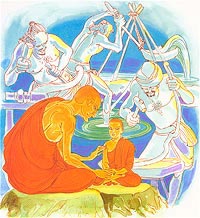 |
Verse 145. Those Who Restrain Their Own Mind
Explanation: Irrigators direct the water. Fletchers shape the arrows. Carpenters shape the wood. The wise consciously control themselves. |
| |
|
|
| |
|
|
| |
|
| |
|
|
|
|
|
|
|